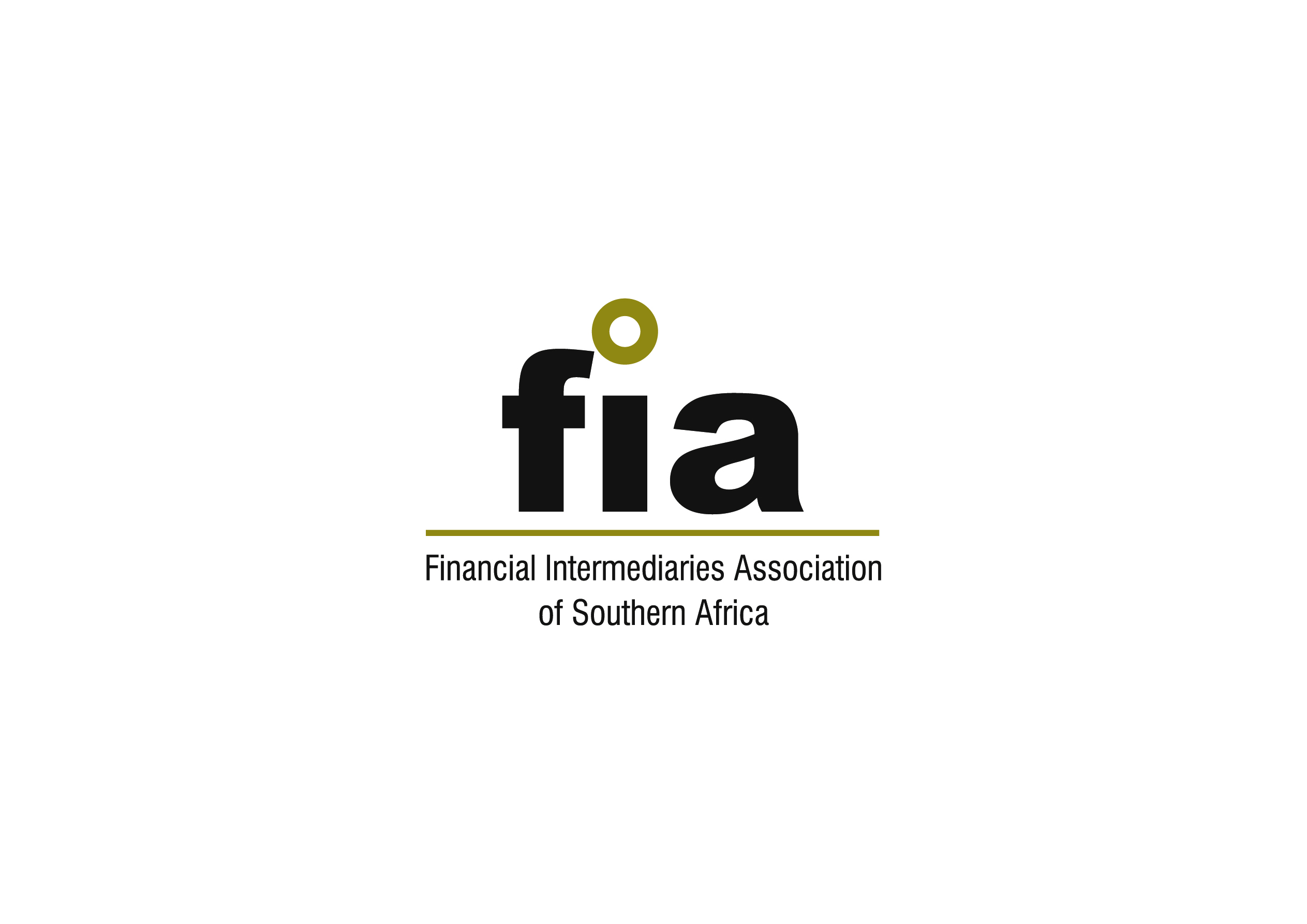
AIE 2021 – Day 1
The 2021 African Insurance Exchange was hosted by the inimitable Bongani Bingwa. No stranger to the AIE stage, Bongani was his usual gracious and accomplished self.
IISA CEO Thokozile Mahlangu welcomed guests, thanked the sponsors, speakers and board members, and fired up the delegates for an interesting and engaging conference.
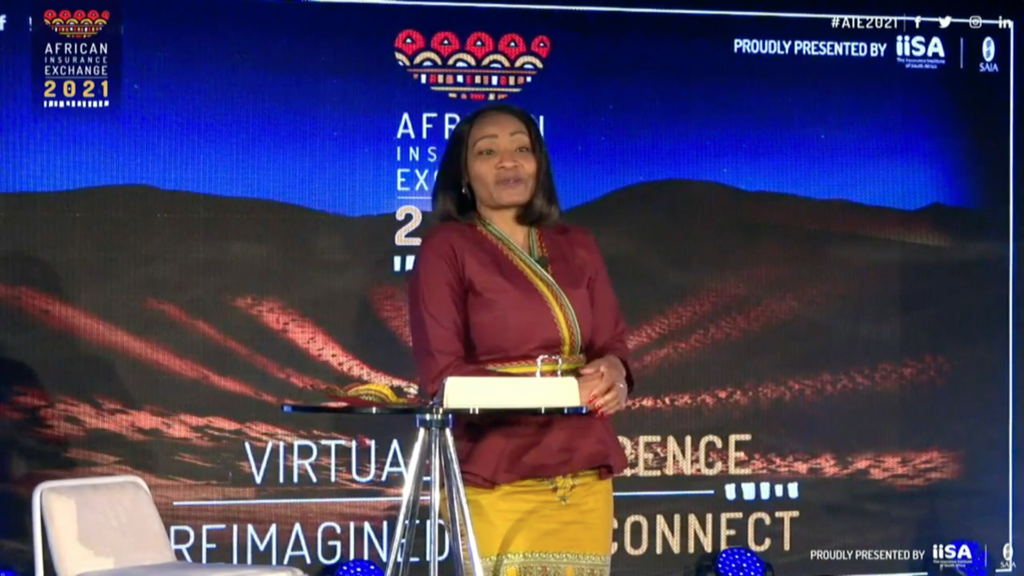
“Let’s reconnect in a reimagined environment,” she said.
Thokozile reminded delegates that a recording of the session will be available on the education portal of the IISA website once the conference is over.

SAIA CEO Viviene Pearson’s welcome address followed. She gave a brief overview of the industry at the moment in the context of Covid-19 and the recent riots in KZN and Gauteng.
Themba Baloyi, IISA President and Chairperson of the Board, gave the keynote address. He spoke of the IISA’s roots back going back as far as 1898 and how the institute’s values of the day still hold today. He encouraged delegates to keep a radically open mind in the current situation. We as citizens have a duty and an opportunity to take charge. We need a complete mindset shift in the way we do things, he said.
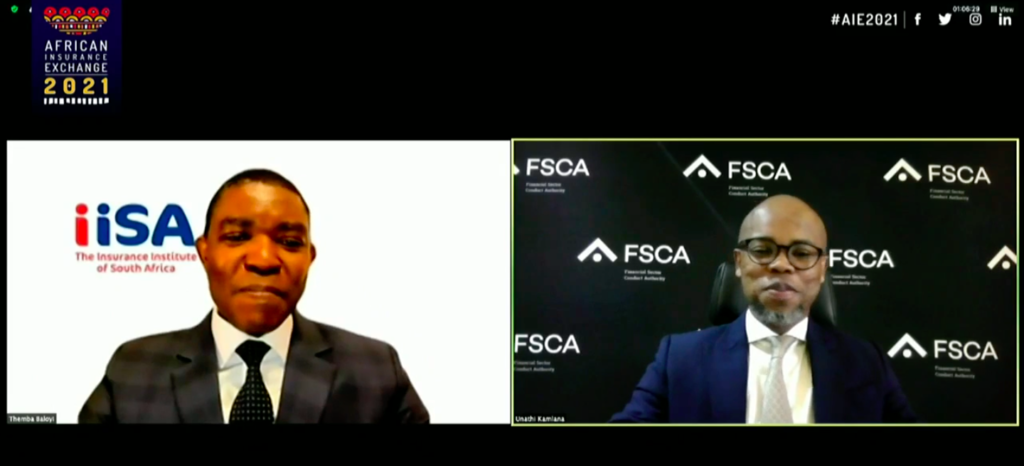
Themba’s keynote was followed by a conversation with newly installed FSCA commissioner Unathi Kamlana, who shared his thoughts on the state of the industry and spoke of his journey to his current role. Unathi went on to share the vision and agenda of the FSCA and discussed the important issues facing the industry today.
Ed Gaze, Senior Manager, Lloyd’s Innovation Lab, took us on a journey into the past – and a bit into the future – in a talk entitled “The evolution of insurance: Insurance 2050”. (Did you know that the first car insured was done so on the basis that it was a “ship navigating on land”?) Ed’s talk focused on tech, AI, robotics, politics, climate change, cyber risks and much more.
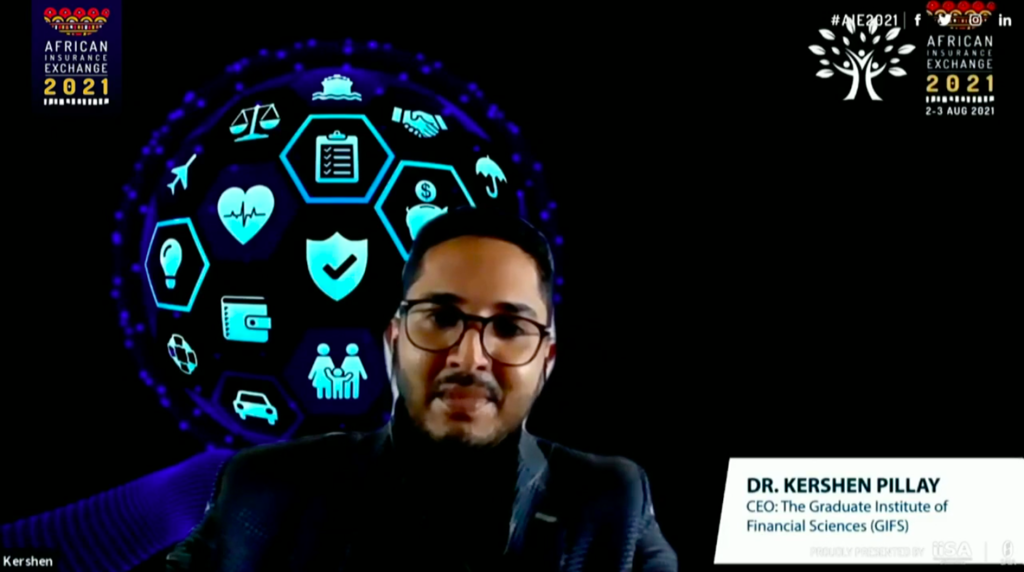
A conversation followed between IISA CEO Thokozile Mahlangu and CEO of the Graduate Institute of Financial Services (GIFS), Kershen Pillay (above), on the professionalisation of the industry through education. Qualifications, he says, need to be future fit and in keeping with this sentiment, he outlined GIFS’s new frameworks for education in the industry going forward.

The topic “Building resilient organisations for a sustainable industry” was tackled by leadership coach and independent non-executive director to insurance companies in South Africa and Nigeria, Marjorie Ngwenya (above), who encouraged delegates to establish what investment needs to be made now and into the future. She was joined on the panel by Purple Group CEO Charles Savage (below). Charles positioned resilient organisations as those that place purpose over profit. We should also not be afraid to fail.
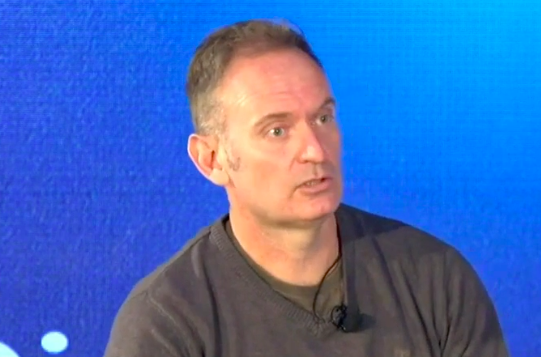
Following Marjorie and Charles was a pair of experts discussing “Intentional Transformation”. The panel comprised Ronald King, head of public policy and regulatory affairs at PSG, and Leon Campher, CEO of Asisa.
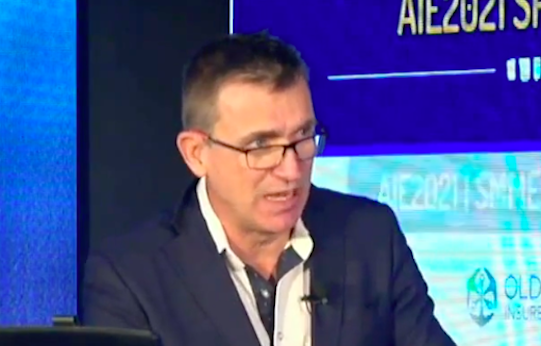
Ronald (above) tackled the issue of joblessness, tying it into hope for the future. Even graduates struggle to find jobs. People expect government to come up with solutions, but it’s only through entrepreneurship and financial education that we will be able to see the unemployment stats change. We need more black brokers to assist in this process.

Leon (above) unpacked Asisa’s transformation drive, highlighting the number of black graduates the association puts through its ranks.
The conversation continued around issues of ethics, morality, legislation, making a difference, and more…
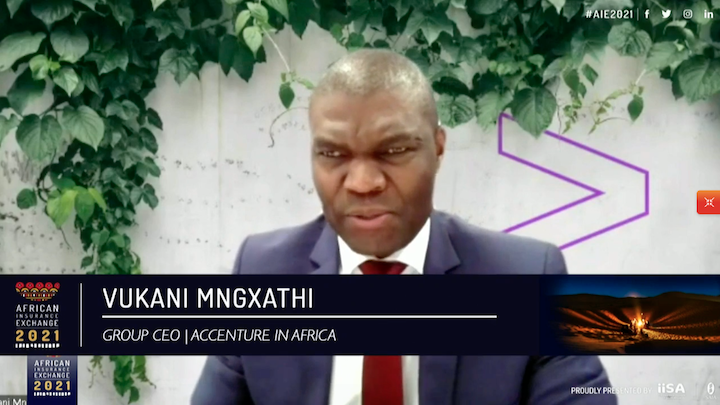
After lunch the conversation turned to technology, with a panel from Accenture discussing megatrends in technology. The panel was made up of Vukani Mngxati (above), Garrick Germanus, Lulama Madikizeka, David Christie, Richard Pouncett and Amantha Naidoo. It focused on a tech report issued recently by Accenture.
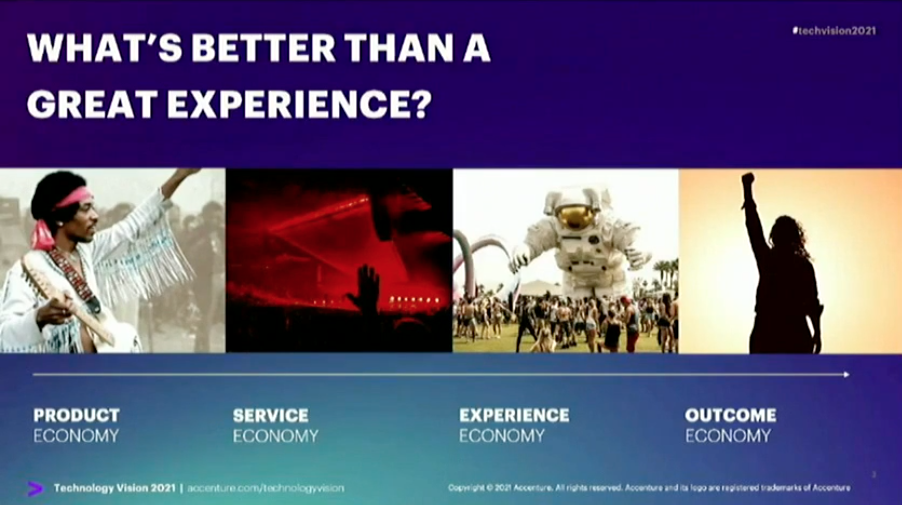
Vukani used music as an analogy to highlight the various types of economies that consumers expect – from product to service to experience to outcome. According to Vukani, 65% of cars bought in 2020 were bought online. The purchasers didn’t even test drive them. The digital environment is certainly pervasive!
Here are some interesting slides from the Accenture presentation:


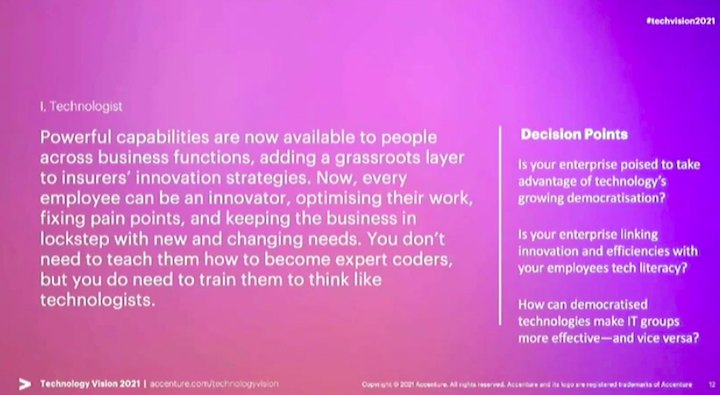
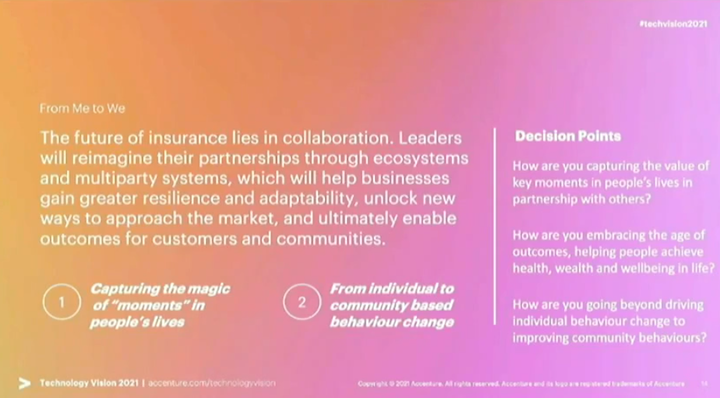
“The world post COVID-19” was the theme of the next session, which was presented by Suzette Vogelsang, head of banking and insurance supervision at the Prudential Authority, Henning Haagen, member of the board of management at Allianz Global Corporate & Speciality and Donald Dinnie, director of Norton Rose Fulbright.

Donald spoke on litigation arising out of COVID claims – mainly in South Africa, but he also touched on matters in the United States. An interesting point that Donald raised is that courts in SA tend to rule in favour of the insured where there are ambiguities in the contract.
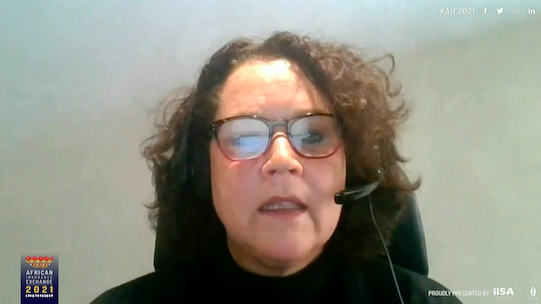
Suzette spoke on the impact of the pandemic on the insurance industry, both locally and internationally, from the perspective of the regulator. “Our insurance sector has demonstrated both financial and operational resilience,” she said.

Henning spoke on the risk scenarios relating to pandemics before 2020. Yes, it was unexpected, bu the world – and insurance industry – has managed the pandemic relatively well. Wordings are key.

“The intersectionality of technology and insurance” topic was opened by Garth de Klerk, CEO of the Insurance Crime Bureau.
“As fast as we develop technology, criminals are developing manners in which to abuse it,” he said. “The future is a fast-moving spot. It’s not something static.”
Garth said it’s important to remember the client when it comes to developing technology. Sometimes a simple solution works better than something more technologically advanced. Never forget that technology includes humans.

For someone who deals with movement, the pandemic hit particularly hard.
“It really forced us to better understand our target market and the technological landscape that we operate in,” said Ramasela Ganda, CEO of Avis/Budget International. Technology is really changing the whole aspect of mobility. Self-driving cars, ride-sharing, car-sharing and other factors have had a huge impact on the environment and the associated insurance risks.
(Imagine a car that can drive itself without anyone even being inside it!)

Belhassen Tonat, head: non-life of Munich Re, challenged delegates to become producers rather than consumers of technology. He discussed the benefits of AI on what we’re going to insure in the future – including intangible assets such as intellectual property. He posed some profound questions: With autonomous cars, why do I need motor insurance? With smart geysers, why do I need to insure them? Insurers are likely to become specialist risk managers for a variety of ecosystems. The ideal is to be proactive.
The final session for the day was entitled “The future is now”. It was presented by Patrick Bracher of Norton Rose Fulbright, Graeme Codrington of TomorrowToday Global and Ryan McMahon VP- Insurance & Government Affairs at Cambridge Mobile Telematics.
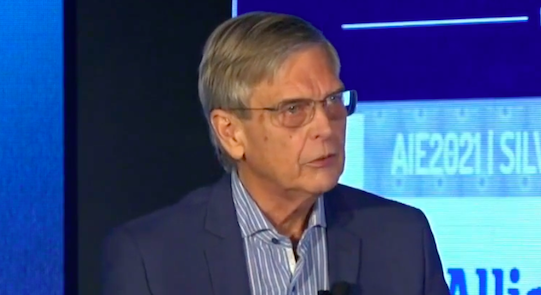
Patrick (above) believes the future is about information. We have to be able to sift through the information we’re bombarded with and work out what’s relevant to us. But what will happen when algorithms (or even insurance companies) know us better than we know ourselves?

Ryan says the most important usage of technology is the mitigation of risk. He spoke about identifying and changing risks through incentive, feedback and education. The key element is transparency, he says. Without transparency there’s no fundamental ability to change the risk because the insurer would just be “taking data” rather than sharing it and using it to drive change in behaviour.
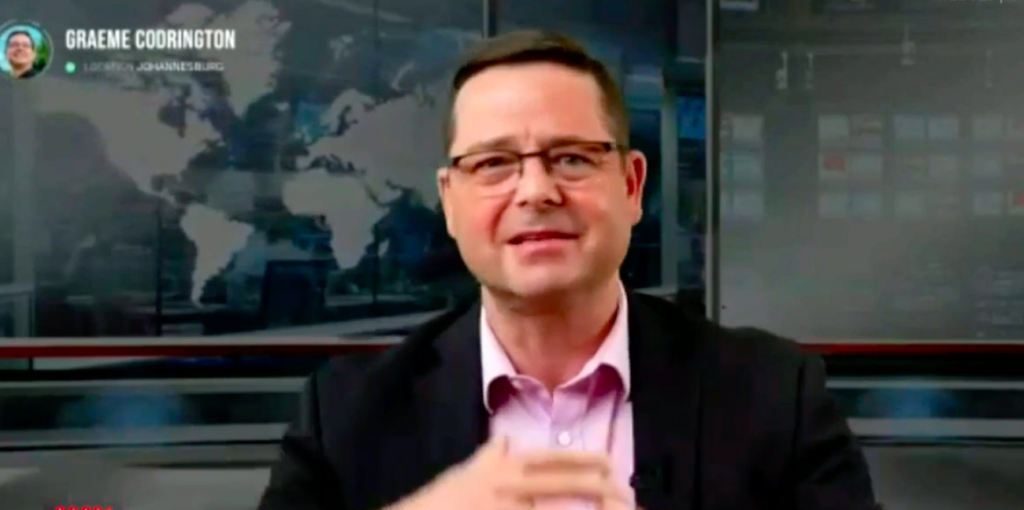
“When we look back from the future we will probably say that Covid wasn’t the most disruptive force of the 2020s,” said Graeme. “I think we will realise that as disruptive as Covid has been, it has accelerated other disruptors, and thats going to be its lasting legacy.
“The speed at which the future is going to arrive will be overwhelming for some people and industries. I think the next 15 years will see more change than the last 50.”




